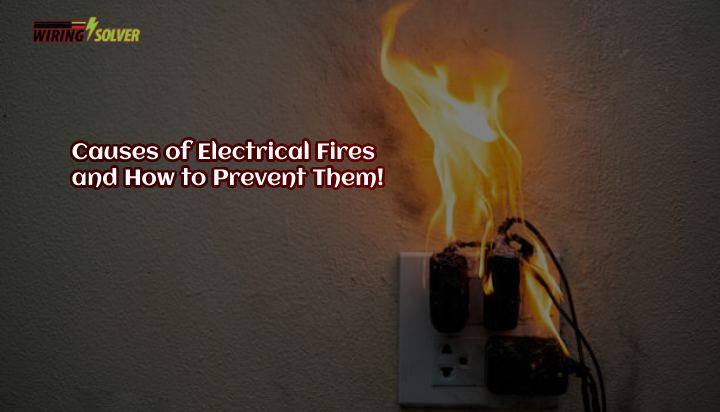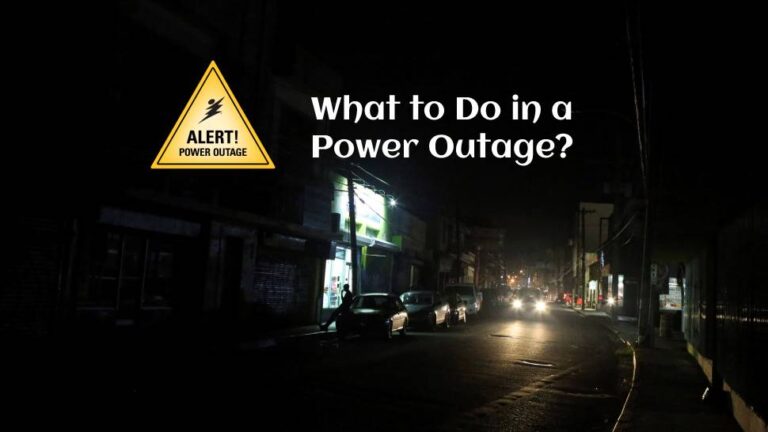Electrical fires can be devastating and can cause a great deal of damage to homes and businesses. Understanding the causes of electrical fires and how to prevent them is essential in keeping your home or business safe.
The leading causes of electrical fires are due to outdated wiring, faulty electrical outlets, frayed wiring, and improper installation. Additionally, overloaded outlets, extension cords, and power strips can increase the risk of an electrical fire.
Fortunately, there are a few simple steps you can take to prevent electrical fires. This article will educate you on the variety of causes behind electrical fires and how you can prevent them.

What Are the Causes of Electrical Fires?
There are several causes when it comes to electrical fires. Starting from device malfunction to human error and negligence. So, what is the cause of electrical fires? Let’s take a look.
Old/Faulty Wiring:
Outdated wiring is one of the major causes of electrical fires. Any house, older than 20 years, should have its’ circuitry rewired.
When such old and fragile wiring is overloaded, it causes major electrical malfunctions, which may lead to electrical fires.
Extension Cord Misuse:
Most homeowners are unaware that there are particular guidelines for using extension cords.
When not utilized properly, extension cables can rapidly overheat and cause electrical fires; also, equipment and appliances plugged into extension cords can become fried after prolonged usage.
The first step to buying an extension cord is to check the cord’s gauge to make sure it complies with your requirements.
Bad Placement of Heaters:
A common electrical appliance in many parts is an electrical heater. Especially during winter, or in cold areas of the world.
But, oftentimes, due to the carelessness of users, they may place it near fabrics. They have the potential to burn fabrics and cause a fire.
Overloaded Fixtures and Outlets:
Overloading an outlet can be a pretty dangerous practice. It causes the circuit to heat up. To a point where it can even melt the plastic.
As many conductive materials are covered in plastic to protect them from other conductive materials, their damage can result in electrical shorts. Which can cause sparks and even fires.
Improper Grounding:
A third prong in the plugs of many appliances is there so that they may run on a higher power. This is the ground prong. So, it is highly advised against using an improperly grounded circuit.
How Can You Prevent Electrical Fires?
There are several preventive methods to employ in order to prevent electrical fires. What are these steps? How to prevent electrical fires? Let’s take a look.
- If the wiring in your house is fairly old, you should consult an electrician and have them replaced. This might cost a lot. It is essential for the safety of your home.
- Make sure to use extension cords properly. Do not use them to run appliances with high power demand.
- Place portable heaters away from fabrics and flammable materials. Avoid placing them on carpets.
- Avoid overloading extension cords. Make sure the appliances are low power demand. Such as small fans, chargers, and your computer.
- Make sure any appliance that requires proper grounding, is grounded. Not only can it cause fires, but it can also spell trouble for your appliance.
- Make sure to use proper GFCI and AFCI breakers as per the NEC requirements.
- Do not overload an outlet. Check the outlets’ wattage rating before plugging in any electrical appliance.
- Use a radiator-style heater. They are safer than portable heaters.
- Make sure no electrical component comes in contact with water or moisture.
- Replace any faulty outlets, if you have any.
- Keep any appliances unplugged when not in use.
These are some of the preventive steps you have to take in order to prevent electrical fires.
How to Put Out Electrical Fires Safely?
There are several steps to follow in order to safely put out an electrical fire. I will go through these steps for you.
Turning off the power:
When tackling electrical fires, the first step is to have someone turn off the electricity at the source, while another tackles the fire.
Otherwise, not only is there a huge possibility of electrocution, but also the possibility of melting off plastic from electrical cables and making a short circuit.
Putting Out the Flame:
Electrical fires should never be put out with water. As it increases the possibility of electrocution. Electrical fires should be put out with CO2 fire extinguishers. But they can also be put out without an extinguisher.
However, if the fire is small, a fire blanket should also be able to put it out.
Assessing Damage and Repairs:
After the fire has been put out, open the windows and doors to let the smoke out. Assess the damage before turning the power back on. Call a professional to check the circuitry for you.
How Can Water Damage Lead to Electrical Fires?
Water and electricity can be a dangerous combination. Water damage to electrical systems can lead to electrical fires.
Leaks, flooding, and poor installation or maintenance can allow water to enter electrical systems and cause short circuits, overheating, and potential fires. This can be the result of poor installation or maintenance.
This can cause the electrical components to short-circuit and create an electrical current that flows through an unintended path, leading to overheating and potentially causing an electrical fire.
Flooding is a common cause of water damage to electrical systems. If a home or building is flooded, the electrical components may short circuit and potentially lead to an electrical fire.
In addition, if an electrical system is exposed to water for an extended period of time, it can corrode and become damaged, increasing the risk.
To protect against the risk of electrical fires, it is important to regularly inspect and maintain electrical systems and to promptly repair any leaks or other sources of moisture.
Summary
In conclusion, electrical fires can be extremely dangerous and should not be taken lightly. It is important to understand the causes of electrical fires and take preventative steps to ensure that your home or business is safe.
Regularly inspect your home’s wiring and electrical systems, replace any damaged wiring, and do not overload outlets or extension cords. By taking these simple steps you can help prevent electrical fires.


![Why Does Power Flicker During Storms? [Explained]](https://wiringsolver.com/wp-content/uploads/2022/11/Why-Does-Power-Flicker-During-Storms.jpg)



